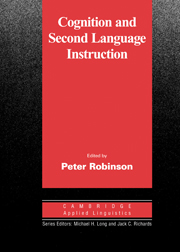Book contents
- Frontmatter
- Contents
- Series editors' preface
- Preface
- SECTION I THEORETICAL ISSUES
- SECTION II COGNITION AND INSTRUCTION
- 7 Cognition and tasks
- 8 Cognitive underpinnings of focus on form
- 9 Intentional and incidental second language vocabulary learning: a reappraisal of elaboration, rehearsal and automaticity
- 10 Task complexity, cognitive resources, and syllabus design: a triadic framework for examining task influences on SLA
- 11 Aptitude, individual differences, and instructional design
- 12 Cognition, instruction and protocol analysis
- References
- Index
11 - Aptitude, individual differences, and instructional design
Published online by Cambridge University Press: 05 October 2012
- Frontmatter
- Contents
- Series editors' preface
- Preface
- SECTION I THEORETICAL ISSUES
- SECTION II COGNITION AND INSTRUCTION
- 7 Cognition and tasks
- 8 Cognitive underpinnings of focus on form
- 9 Intentional and incidental second language vocabulary learning: a reappraisal of elaboration, rehearsal and automaticity
- 10 Task complexity, cognitive resources, and syllabus design: a triadic framework for examining task influences on SLA
- 11 Aptitude, individual differences, and instructional design
- 12 Cognition, instruction and protocol analysis
- References
- Index
Summary
Introduction: a paradox in SLA research
Individuals who attempt to learn a foreign language differ dramatically in their rates of acquisition and in their ultimate attainment. This is perhaps the clearest fact about SLA that we currently have, and of course it is particularly striking in relation to the relative uniformity of learning rate and ultimate success in L1 acquisition. Bley-Vroman (1989), among other scholars, has argued that these differences demonstrate that the underlying L1 and L2 acquisition processes must be fundamentally different. Whether or not L1 and L2 acquisition develop in completely different ways, it is important for both theoretical and practical reasons to attempt to specify and understand the sources that contribute to differences among second language (L2) learners.
The paradox is that despite this importance, L2 research into the sources of individual differences (IDs) has lagged far behind research seeking universal principles. With the exception of the social psychologically oriented work on motivation and other affective variables pursued by Robert Gardner (see Gardner & MacIntyre, 1992, 1993, for an overview), no major research program focusing on IDs and integrating them within a model of SLA has yet been developed. This is partly due to limitations inherent in the correlational research designs favored by earlier studies, and the difficulty of finding reliable and valid measures of both the learner traits and the L2 learning outcomes (Larsen-Freeman & Long, 1991; Lightbown & Spada, 1993).
Information
- Type
- Chapter
- Information
- Cognition and Second Language Instruction , pp. 319 - 353Publisher: Cambridge University PressPrint publication year: 2001
Accessibility standard: Unknown
- 86
- Cited by
